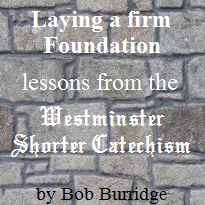
Five Alone
(The Five Solas of the Reformation)
For God’s Glory Alone
(watch the video)
by Bob Burridge ©2014
The 16th Century Reformers identified
Five things that Stand Alone.
These five principles challenged the church at that time to get back to the Bible and its teachings. They were a summary of the foundations of a truly biblical Christian faith. These are what our lives should be based upon so that we truly please God.
Not all were convinced by the work of the Reformers, but though these basic principles many found the transforming power of the Gospel of God’s Grace.
Things had become confused back then because what God said had been blended with commonly accepted beliefs and practices that didn’t come from God’s word. The result was a popular and powerful church that was misleading and manipulated the masses.
First, a brief review of these Five Principles
The first is Sola Scriptura — Scripture Alone.
The Bible as God’s word should be our only standard for faith and practice. In that collection of books, God tells us in his own words what’s right and true. We don’t need any human experts to add to that word. The best our teachers and counselors can do for us is to help us understand God’s word.
The next is Sola Gratia — Grace Alone.
Salvation doesn’t come by anything we earn or deserve. It’s ours by God’s undeserved mercy with nothing added or needed from us. We’re all merely sinners saved by grace.
It’s ours by nothing but Christ Alone — Soli Christi
Jesus Christ accomplished by his life and death all we need to be made right with God. He suffered and died in place of his people to fully pay their debt of moral guilt.
Then there is Sola Fide — Faith Alone.
We are declared innocent by faith in the work of Jesus Christ, and by that alone. There’s nothing we can add to make what he did effective for us. There are no merits to accumulate, no good works we can do, no church rituals to engage in. This Saving Faith is ours by God’s mercy. By it we rest in the promise of God in Christ.
We conclude with the final point: Soli Deo Gloria – to God’s Glory Alone.
We should live our lives in thankfulness, making sure that it’s all lived for God’s glory.
The Apostle Paul summarized this final principle.
1 Corinthians 10:31, “Whether, then, you eat or drink or whatever you do, do all to the glory of God.”
This is a general rule which applies to all situations, for all people, all the time. All breathe his air, drink his water, and eat the nourishment he created for them. They build houses on his land, and use the materials he provides. They work with skills and opportunities God alone gives them. They enjoy the company, love and security of others the Lord brings into their lives.
For anyone to fail to live gratefully all the time and for all things is to steal glory from God. As thieves of his glory, no one should be surprised that the good things they have don’t satisfy them.
If a person doesn’t have the glory of God as the central motivating concern in his life there will be something noticeably missing. Life and all we get in it will seem to have an element of emptiness and futility. People busy themselves with all sorts of entertainment and material gains to try to fill that emptiness, but nothing else can really satisfy the need.
Blaise Pascal was an important mathematician, physicist, and philosopher. He spoke of man having a “God-shaped vacuum” in his soul. Only God can fill that central place that acts as the focal point of our lives. Nothing else fits, not even those carefully designed substitutes. The soul was emptied in Eden when humanity in Adam lost fellowship with God.
People are often thankful for what they have, but not always thankful to God as the giver. When they talk about “Thanksgiving”, it’s more a “Thanksgetting”. They fail to honor the God who gave all things to them.
It’s encouraging when we hear children learn to say “thank you” when you give them something. It shows us that their parents are trying to help them learn the importance of courtesy to show others that what they gave them was appreciated.
We should all do the same with all God gives us. He’s the source of all we enjoy and need for our lives. We should live our whole lives in gratitude, offering our thanks to him. We do that directly in worship and prayer, and in our behavior and attitudes.
Our Shorter Catechism begins by asking,
“what is the chief end of man?”
The profound answer to that question takes us right to the main purpose of life here on earth. It says, “Man’s chief end is to glorify God, and to enjoy him forever.”
This doesn’t mean you make God glorious, or add to his glory. He’s already perfectly glorious. It means you recognize his glory. It means you live in ways that show you appreciate his glory, and display it here in this world he created.
Our gratitude to God needs to go far deeper than a prayer of thanks over a meal. While this is very important, your thankfulness has to go deeper than just that. After you pray are you still mindful of God’s giving you your food as you eat it?
Are you so thankful that you use all he gives you in ways that please him? Do you care enough about showing the qualities of Christ in your life, that you’re devoted to changing to be more merciful, patient, forgiving and kind? Do you work on making sure your language doesn’t dishonor God and his holy ways? Do you keep his Creation Sabbath Day holy, all 24 hours of it? Do you bring all of God’s tithe to him to enable his church to carry out it’s work? Does it concern you when you see others neglecting Christ or not honoring their Creator? Do you speak out for Christ offering him to others as their only hope of being made right with God?
Don’t let your busy schedule keep you from making time to serve Christ in your life. Don’t let your hobbies, sports, entertainment, and opportunities tempt you to miss worship, or your times of Bible study, prayer, and Christian fellowship. Don’t let the love of the gifts God gives lure you into forgetting the one who gave them.
This verse says that in whatever you do, in all of life, it needs to focus on God’s glory, even when things don’t go the way you would have wanted, even in suffering.
In Acts 3 Peter healed a lame man and explained
to the crowd that Jesus was the Promised Messiah.
He reminded them that they had brutally and unjustly killed this Promised One. He talked about resurrection from the dead, a teaching the observing Sadducees had rejected. He called the people to repentance and faith in the Savior. In the next chapter we see that about 5,000 believed the message of the Gospel.
The next day Peter and John were arrested (Acts 4), and were asked by what power they healed and spoke about Jesus as they did. The accusers were impressed and marveled at Peter’s response in verses 8-12, “He said, “Rulers of the people and elders of Israel: If we this day are judged for a good deed done to a helpless man, by what means he has been made well, let it be known to you all, and to all the people of Israel, that by the name of Jesus Christ of Nazareth, whom you crucified, whom God raised from the dead, by Him this man stands here before you whole. This is the ‘stone which was rejected by you builders, which has become the chief cornerstone.’ Nor is there salvation in any other, for there is no other name under heaven given among men by which we must be saved.”
The ones arresting them had nothing to say in response. They just told the Apostles to say nothing more about Jesus, then threatened them. Peter then explained that God’s command must be obeyed over the commands of men. The Jews were confounded, but could do nothing but let them go.
The passage concludes in Acts 4:21,
“So when they had further threatened them, they let them go, finding no way of punishing them, because of the people, since they all glorified God for what had been done.”
In the face of all the opposition, the Apostles and the other believers turned the focus to what needs to be the center of all our thoughts, actions, and intentions. They Glorified God.
This Gospel had become confused again in the 16th Century.
The church had elevated herself to a place of mystical glory on earth. The Ministers again called themselves “Priests”, wore fancy expensive robes, and were treated as royalty. Power over lost souls was claimed to rest in the clergy alone. The leaders of the church didn’t present themselves as sinners saved by grace. They considered themselves to be special power-brokers of God’s forgiveness and blessings. The elements of the Lord’s Supper were imagined to have magical powers. Showy cathedrals accumulated unimaginable wealth for the Priests and Bishops.
Scripture no longer stood alone. It was supplemented by what the church had added. Grace was seen as dependent upon things we do, instead of resting upon God’s eternal decree and the work of Christ Alone. Faith was a trust in the church’s powers, rather than in the promises of God. Justification was seen as earned by good works or purchased, rather than obtained by trusting in Christ Alone. The glory had shifted from the Creator and Savior to the marketers of religion.
Another Reformation took place in the early 17th Century,
just 100 years after the Protestant Reformation,
The Church of England had become horribly corrupt abandoning the Five Solas of the Reformation.
Believers who remained in the church fought hard for its spiritual purity. They were called Puritans. They suffered intense persecution by a powerful union of the church and civil government. Some decided to separate from the church . They were called Separatists.
Things got so bad that a group of Separatists left England and moved to Holland to find religious freedom. They stayed for awhile, but were troubled by the worldly life style they found there. There was also a growing threat of being caught up in a deadly war between the Dutch and the Spanish. So in 1620 they left Holland, and sailed to organize their own settlement in the new world.
Edward Winslow (3rd signer of the Mayflower Compact when they first landed) described a celebration of thanksgiving in the following year of 1621. To show their dedication to the glory of God alone he wrote, “God be praised. We had a good increase of Indian corn and our barley ….our harvest being gotten in, our governor sent four men on fowling, that so we might, after a special manner, rejoice together after we had gathered the first fruit of our labors… by the goodness of God, we are far from want, that we wish you partakers of our plenty.”
Still today, many things compete to be the center of our attention.
When God’s glory isn’t first, other things will dominate our lives. The glory shifts from God to become centered on ourselves. Self-esteem replaces humble esteem of Christ above all. To feed what seems most important to him, the fallen soul tries to boost that self-esteem. The honoring of God is suppressed.
A self-centered person becomes a god to himself. His own mind and feelings become the test of truth. Some come to think of their salvation as depending upon their own efforts, accomplishments, and choices. What benefits them in this life becomes the goal and measure of everything else. He imagines his self-esteem, possessions, popularity, and power to be his best hope for happiness. He, his children, and all those he influences, miss out on the greatest hope for happiness which is: living for the honor and glory of his Creator, and submitting to and loving the truth that sets us free. If God through Christ isn’t appreciated above all else everything becomes empty, unsatisfying.
When God’s given the glory, a true inward confidence and joy becomes possible. There have been no happier and joyous people in all of history than those who have found salvation in Christ and who learn to give Glory to God alone. That’s the way the Creator made us to live. That’s why no other way works. Rather than steal honor from the One who made us, we need to live and worship for God’s glory Alone.
We need to understand and proclaim
the 5 solas in our confused world.
Truth mixed with even the tiniest error, is no longer truth. Adding to Scripture, supplementing Grace, looking to more than what Christ accomplished, or trusting in things other than the proper object of Saving Faith, produces a false religion and honors a false god. When these don’t stand alone the one True God is not honored in your life.
The first of the 10 Commandments summarizes one of the basic moral truths of the universe: The Lord said, “You shall have no other Gods before me.”
Either God’s glory stands alone as our motive and goal in all things, or everything becomes flexible, imaginary figments of our needs, rather than the foundation of reality. If our foundation is mixed with other things, then the mixture is our foundation, not the foundation laid down by God’s authority. Paul calls a mixed religion another gospel.
Evil works in a most subtle way. Rather than tempting us to reject obvious truths revealed by God, it entices us to dilute them with false assumptions.
Reformation must continue if we are to be holy and happy, and to honor our King. When you leave the place of worship to get back to your work, family, friends and personal interests, where will God be in all your thoughts? Will his moral commandments fade into the background, replaced with the lure of temptations? Will you remember to live thankfully to him for all you have and enjoy? for your health? opportunities? family and friends? Will he take first place in what you value and consider important? Will knowing and understanding his word be more important than
your phone calls, e-mails, entertainment, the daily news, hobbies, and possessions?
Taking time to see God and his care in all these things makes everything more valuable to us. Without him there is no real value in them at all. He gives life it’s meaning and purpose.
Psalm 92 begins this way in verses 1 and 2, “It is good to give thanks to the Lord, And to sing praises to Your name, O Most High; To declare Your lovingkindness in the morning, And Your faithfulness every night,”
Don’t miss out on the wonders of God’s creation and the amazing grace that opens your eyes to appreciate the loving provision of our Savior Jesus Christ.
Make God’s wonder the center of your thoughts and desires. Give thanks to God — for this is good.
Bible quotations are from the New King James Version unless otherwise noted.







